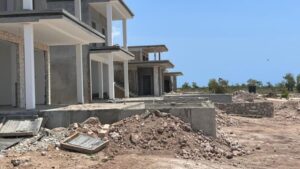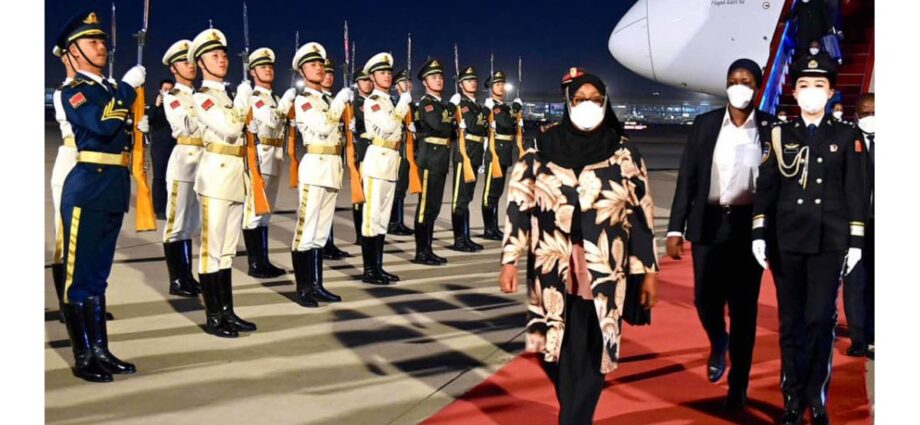Editorial by By Charles Makakala
President Samia Suluhu Hassan is on a three-day state visit to China at the invitation of her Chinese counterpart, Xi Jinping. The visit is intended to strengthen bilateral ties and finalise contracts between the two nations.
Coming shortly after President Xi’s re-election for the third term, the trip carries huge symbolic importance. The Tanzanian delegation has undoubtedly taken note of that.
Any visit to China by a leader from a developing nation is usually something to look forward to. The Chinese have perfected the art of diplomatic flattery, taking a page from the Soviets. Leaders are greeted with elaborate ceremonies and awarded dubious honours. Many of them succumb to such tricks, selling their people’s birthrights as a result.
Tanzanians have a reason to keep President Hassan in their prayers. A visit to China is a time of great trials for African officials. China’s hospitality comes at a price. This time around, the Chinese must have the multibillion-dollar Bagamoyo SEZ and Tazara SGR projects firmly in their sights.
Xi visited Tanzania barely a month after assuming office in 2013. With his emblematic Belt and Road Initiative (BRI) in mind, his goal was to secure Bagamoyo port for China. His priorities are unchanged: the port will connect eight African markets to China’s economy. It remains to be seen whether the Chinese conditions will be better than those Magufuli rejected.
Tanzanians will have a few things on their wish list as well. They have been quite adept at accumulating loans. And they are not done. They still need more funds for SGR, DART, and so on. The current cash crunch in China notwithstanding, China is still a solid bet for most of these projects.
But the Chinese are not just good at massaging people’s egos so that they can smoothly rip them off. They excel at so many other things. Lately, they specialise in producing “world’s firsts” and “world’s biggest” in many fields. As a result, a trip to China presents a marvellous opportunity to observe how serious others are about the business of development.
For example, the Chinese have built the most comprehensive high-speed railway network in the world. It can accommodate trains travelling at speeds of up to 430kph. The network not only helps to decongest cities by allowing people to live far from heavily crowded places, but also allows for investment in distant locations.
Tanzania is similarly making valiant efforts to improve its transport systems. However, its priorities are all over the place. One is often left wondering what the point of what is being implemented is. Ultimately, vast sums of money are squandered on pointless projects.
China is also constructing a network of canals to carry water from the wetter south to the dry north. When complete, the project will transport 12 trillion gallons of water to 45 million people living thousands of kilometres away. It is the most ambitious and costliest undertaking of its kind in the world.
On the other hand, Dar is reeling from yet another round of water rationing, once again blamed on Mother Nature. The depressing sights of women and children walking about with empty water buckets have returned. Worse still, Dawasa issued a timetable saying that water would be cut once per week, but it is now a sixth day since I last saw a drop of water from Dawasa.
This madness must end.
President Hassan and her delegation should stay in China longer to see how things are done if that means things will improve here. The Chinese are doers, not talkers; they are strategic, not pathetic. Tanzania might benefit from a few leaders like that.
But China was not always like this. Once upon a time, China was all talk and no walk. Its leaders, particularly Deng Xiaoping, had to instil an entirely new leadership mindset. Even when China was the fastest-growing economy in the world, Deng wanted it to do more. That prompted him to come out of retirement at the age of 87.
“All I see on TV are ceremonies—our leaders must think they’re TV stars,” he declared. “The meetings are excessive, the speeches are repetitive, no new ideas. We should give priority to deeds, not to words.”
Doesn’t this sound familiar? Nevertheless, the tours that Deng made turbocharged China. The decade that followed was unprecedented in Chinese economic history.
In The End of Poverty, Jeffrey Sachs captures what happened well:
“We arrived at night and drove for miles past campfires. Each of these was a building under construction. There was no crane in sight. The multi-storey buildings were going up by hand. I learned what a 9 percent growth rate means: an economy that is growing around the clock, making up for 550 years of lost time.”
On this side, doesn’t it feel like our leaders have conspired to lose those 550 years first before they get serious?
In 1978, Deng commissioned four study tours to Europe, Japan, and Hong Kong. The reports became the cornerstone of his economic policy. Deng asserted unequivocally that “we are backward, many of our ways of doing things are inappropriate, and we need to change”.
Common sense is the most valuable asset that any leader can possess.
Tanzania could use its own Deng Xiaoping. That is why I hope President Hassan will take her time in China. Probably a month or two. We could use a massive dose of Chinese economic pragmatism.
But just that, if you catch my drift.
Share this news
This Year’s Most Read News Stories

Rare megamouth shark found in Zanzibar for the first time – why so little is known about it
The recent sighting was only the sixth time a megamouth had ever been found off the coast of Africa.Continue Reading

Shock waves hit Zanzibar’s Real Estate industry
The revocation of British developer Pennyroyal’s leasehold for the construction of Blue Amber Resort by the Revolutionary Government of Zanzibar has sent shock waves in the nascent property market on the Isles.Continue Reading

Air Tanzania Banned From EU Airspace Due to Safety Concerns
Several airports have since locked Air Tanzania, dealing a severe blow to the Tanzanian national carrier that must now work overtime to regain its certification or go the wet lease way
The European Commission has announced the inclusion of Air Tanzania on the EU Air Safety List, effectively banning the airline from operating in European airspace.
The decision, made public on December 16, 2024, is based on safety concerns identified by the European Union Aviation Safety Agency (EASA), which also led to the denial of Air Tanzania’s application for a Third Country Operator (TCO) authorisation.
The Commission did not go into the specifics of the safety infringement but industry experts suggest it is possible that the airline could have flown its Airbus A220 well past its scheduled major checks, thus violating the airworthiness directives.
“The decision to include Air Tanzania in the EU Air Safety List underscores our unwavering commitment to ensuring the highest safety standards for passengers in Europe and worldwide,” said Apostolos Tzitzikostas, EU Commissioner for Sustainable Transport and Tourism.
“We strongly urge Air Tanzania to take swift and decisive action to address these safety issues. I have offered the Commission’s assistance to the Tanzanian authorities in enhancing Air Tanzania’s safety performance and achieving full compliance with international aviation standards.”
Air Tanzania has a mixed fleet of modern aircraft types including Boeing 787s, 737 Max jets, and Airbus A220s.
It has been flying the B787 Dreamliner to European destinations like Frankfurt in Germany and Athens in Greece and was looking to add London to its growing list with the A220.
But the ban not only scuppers the London dream but also has seen immediate ripple effect, with several airports – including regional like Kigali and continental – locking out Air Tanzania.
Tanzania operates KLM alongside the national carrier.
The European Commission said Air Tanzania may be permitted to exercise traffic rights by using wet-leased aircraft of an air carrier which is not subject to an operating ban, provided that the relevant safety standards are complied with.
A wet lease is where an airline pays to use an aircraft with a crew, fuel, and insurance all provided by the leasing company at a fee.
Two more to the list
The EU Air Safety List, maintained to ensure passenger safety, is updated periodically based on recommendations from the EU Air Safety Committee.
The latest revision, which followed a meeting of aviation safety experts in Brussels from November 19 to 21, 2024, now includes 129 airlines.
Of these, 100 are certified in 15 states where aviation oversight is deemed insufficient, and 29 are individual airlines with significant safety deficiencies.
Alongside Air Tanzania, other banned carriers include Air Zimbabwe (Zimbabwe), Avior Airlines (Venezuela), and Iran Aseman Airlines (Iran).
Commenting on the broader implications of the list, Tzitzikostas stated, “Our priority remains the safety of every traveler who relies on air transport. We urge all affected airlines to take these bans seriously and work collaboratively with international bodies to resolve the identified issues.”
In a positive development, Pakistan International Airlines (PIA) has been cleared to resume operations in the EU following a four-year suspension. The ban, which began in 2020, was lifted after substantial improvements in safety performance and oversight by PIA and the Pakistan Civil Aviation Authority (PCAA).
“Since the TCO Authorisation was suspended, PIA and PCAA have made remarkable progress in enhancing safety standards,” noted Tzitzikostas. “This demonstrates that safety issues can be resolved through determination and cooperation.”
Another Pakistani airline, Airblue Limited, has also received EASA’s TCO authorisation.
Decisions to include or exclude airlines from the EU Air Safety List are based on rigorous evaluations of international safety standards, particularly those established by the International Civil Aviation Organization (ICAO).

Sign up for free AllAfrica Newsletters
Get the latest in African news delivered straight to your inbox
The process involves thorough review and consultation among EU Member State aviation safety experts, with oversight from the European Commission and support from EASA.
“Where an airline currently on the list believes it complies with the required safety standards, it can request a reassessment,” explained Tzitzikostas. “Our goal is not to penalize but to ensure safety compliance globally.”
Airlines listed on the EU Air Safety List face significant challenges to their international operations, as the bans highlight shortcomings in safety oversight by their home regulatory authorities.
For Air Tanzania, this inclusion signals an urgent need for reform within Tanzania’s aviation sector to address these deficiencies and align with global standards.
The path forward will require immediate and sustained efforts to rectify safety concerns and regain access to one of the world’s most critical aviation markets.
Source: allafrica.com











